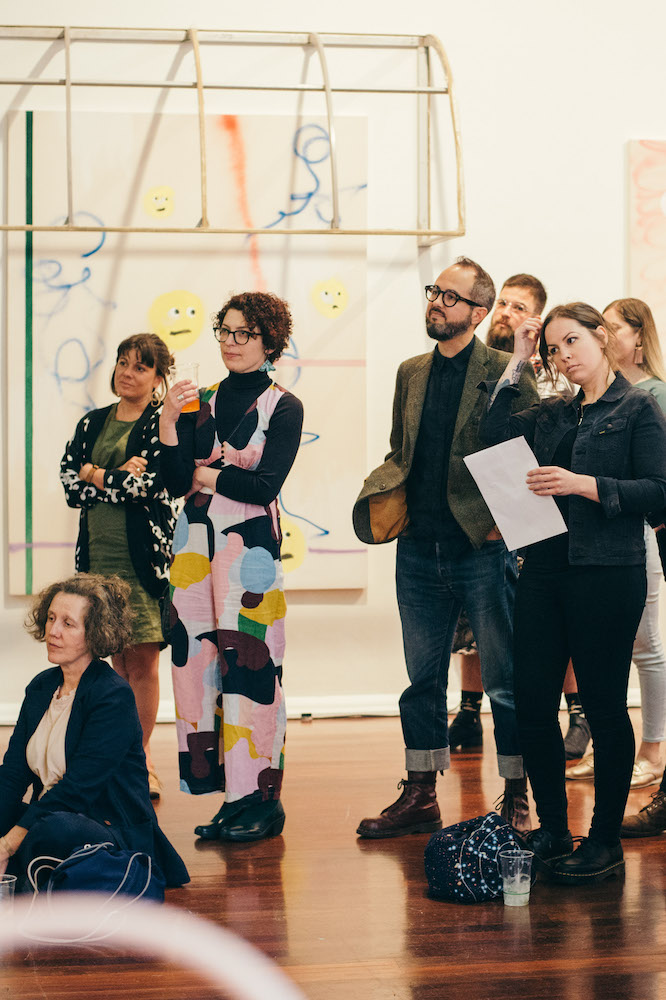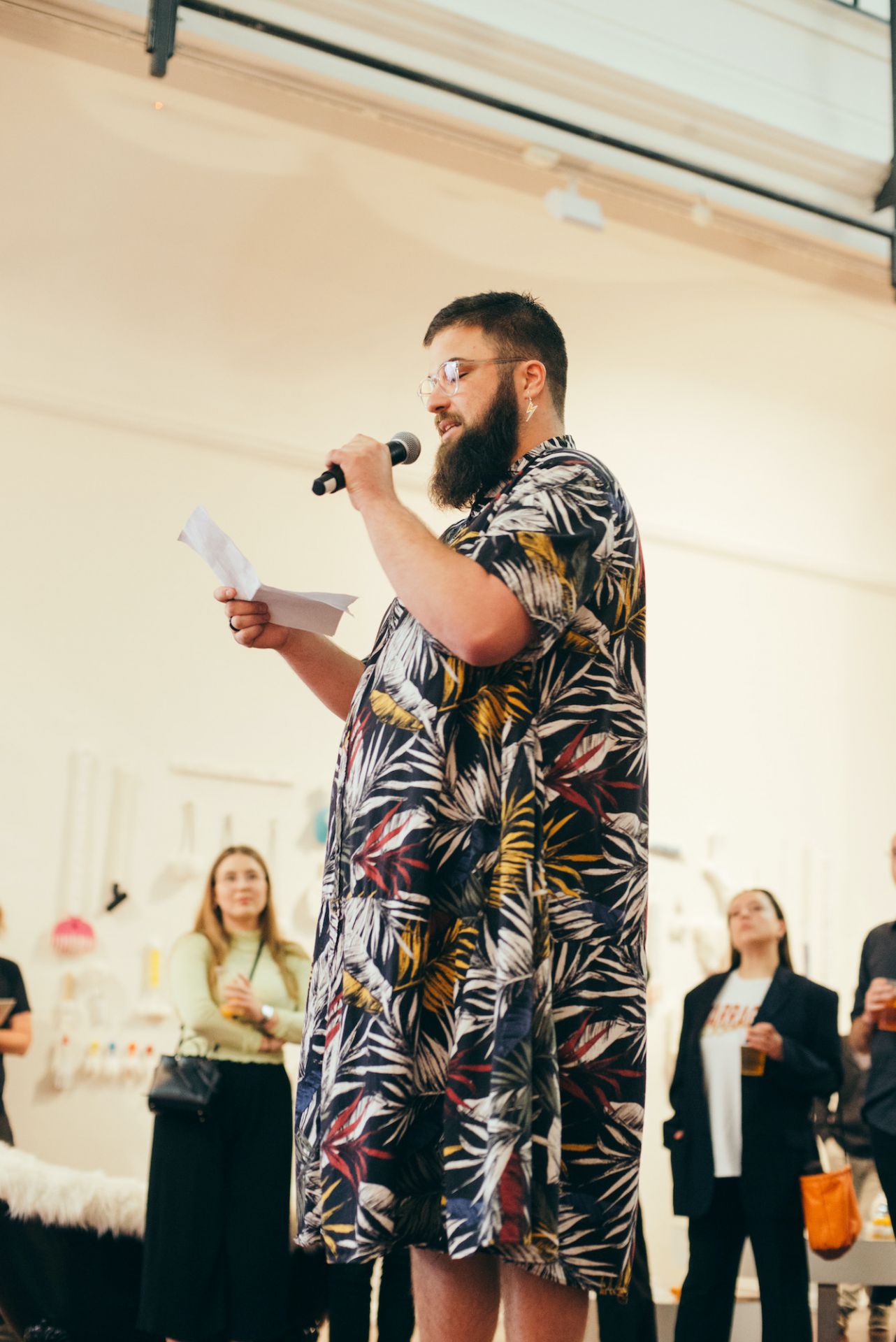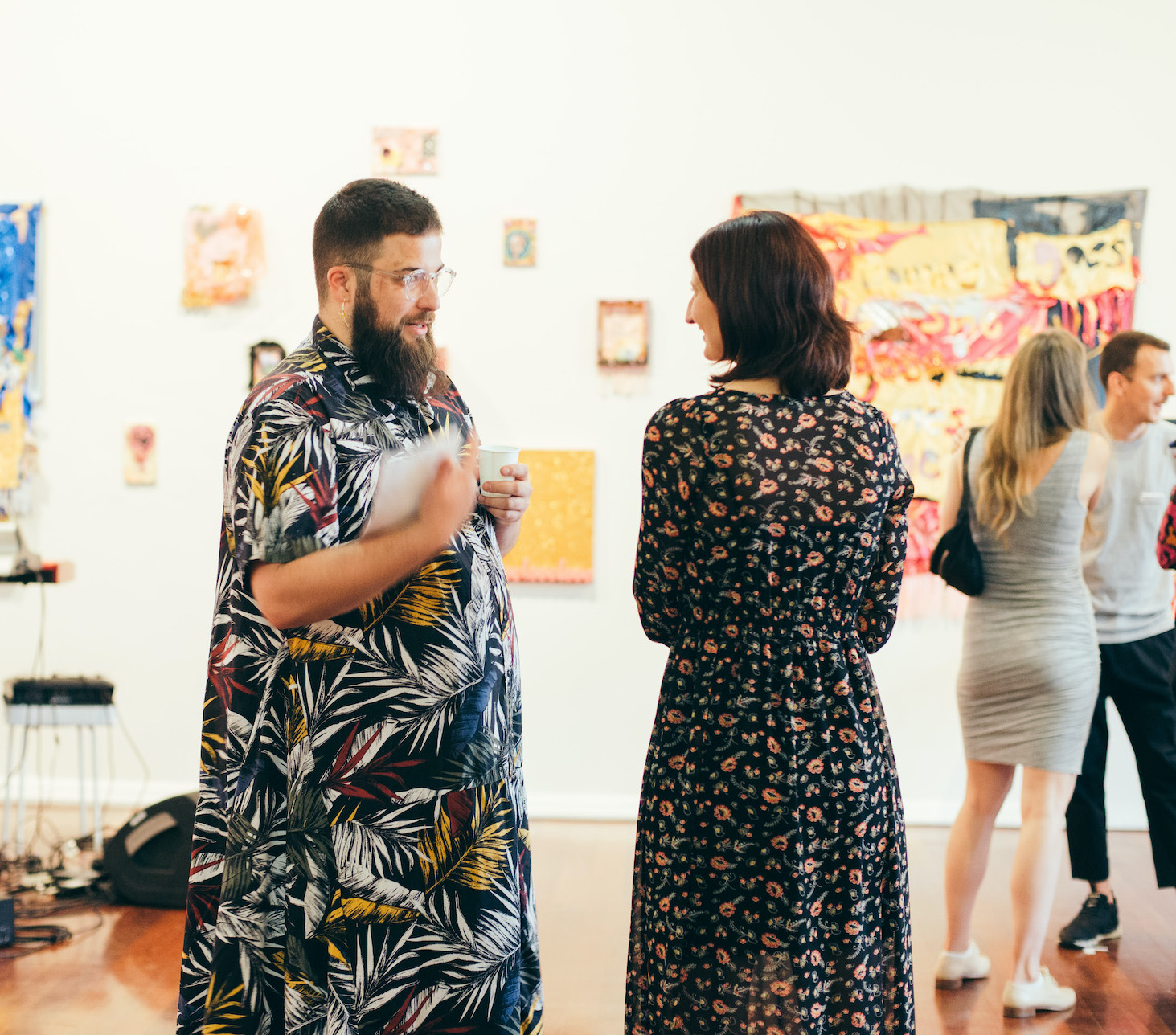PIC A celebrated the end of Hatched 2020 with the Night School closing event on Friday 9 October. Three incredible artists were invited to speak at an informal rally on the night.
A celebrated the end of Hatched 2020 with the Night School closing event on Friday 9 October. Three incredible artists were invited to speak at an informal rally on the night.
Daley Rangi, Tanya Lee and Cassie Lynch, whose artistic backgrounds range across various artforms and relationships with formal education, shared their experiences of life-changing encounters with performances, poems, learning and teaching, to reinforce the love we share for the arts and humanities and the transformative ways that education can enrich our lives.
Below is a transcript of Daley Rangi‘s rally cry.
Kaya noonakoort, kia ora e hoa, hello everyone; friends, colleagues, strangers, and strange souls. I was asked to speak on behalf of the value of the arts, and the imminent encroaching threats to arts and humanities education. I don’t believe I need to actually speak to either of those, to any of you gathered here tonight, as that would be preaching obnoxiously to you, my wretched tired choir, but goddamn it, let’s rally anyway. It is worth noting my autism, so please excuse my passionate rambling rant. Firstly, fuck the current federal government, and fuck their stupid budget. I thought I may as well fucking address it. There are small wins for various wonderful parts of the community in there, so this is not a sweeping general statement about the entire fucking thing, but on behalf of the arts community specifically, fuck you. Apologies, if I am not allowed to say fuck, I am really fucking sorry. Moving the fuck on. Five minutes is not enough to time to deal with any of this, but I’ll try my best to give you something to take home with you.
 To be frank, or at least, to be Daley, I do not have a degree. I have studied though. I have some form of formal education. I have studied film, journalism, radio, theatre, law, politics, economics, climate science, endangered languages. I have studied a lot. I just don’t have a certificate to prove it. I am a natural autodidact. It’s my coping mechanism, to be curious about the world. When you have lived a life of extensive personal trauma amidst an entire global ecosystem under threat and constant political unrest, it is natural to be eternally anxious about how to fix things. I am just lucky enough to be residing in a place where I could access this study and had the choice to explore and expand these intense curiosities. Maybe these systems did not quite accept my neurodiversity, and still don’t, but disability advocacy is another discussion altogether. This platform is a great start, and access to education is a necessity.
To be frank, or at least, to be Daley, I do not have a degree. I have studied though. I have some form of formal education. I have studied film, journalism, radio, theatre, law, politics, economics, climate science, endangered languages. I have studied a lot. I just don’t have a certificate to prove it. I am a natural autodidact. It’s my coping mechanism, to be curious about the world. When you have lived a life of extensive personal trauma amidst an entire global ecosystem under threat and constant political unrest, it is natural to be eternally anxious about how to fix things. I am just lucky enough to be residing in a place where I could access this study and had the choice to explore and expand these intense curiosities. Maybe these systems did not quite accept my neurodiversity, and still don’t, but disability advocacy is another discussion altogether. This platform is a great start, and access to education is a necessity.
To be upfront, within your Western frameworks, as mentioned, I have autism, but I am also queer, and I am also First Nations New Zealander. I tick a lot of those funky arts boxes, right? That’s a big talk for another time. Y’all got some problems. My ancestors would likely have none of that though. These are all colonial terms. To my tūpuna, influenced by my whakapapa, and within Māoritanga, I would rather consider myself a Te Ātiawa takatāpui takiwātanga. I am also wary of speaking too loudly or brashly, as I am still a visitor to these lands, despite having resided here for a while, and I’d like to take a moment to thank the custodians of these lands, the Whadjuk people of the Noongar nation, for looking after this boodja for tens of thousands of years, from where I live in Boorloo to where we are now near Goologoolup, and acknowledge that sovereignty was never ceded here, there, or anywhere near. I would like to pay my respects to all elders past, present and emerging, to the ancestors long gone but always here, and my own ancestors who have given me the strength to be here today. Tread with care and listen and learn wherever you may be.
The arts helped me find a place to exist, and a way to express myself and make sense of the chaos within; to tell my story, and to connect with community. A great way to give folks a sense of bodily integrity is to give them the chance to connect with stories and art, to see themselves either literally or metaphorically represented, and to know that they’re not alone in the fight. When you don’t have everything handed to you on a plate, you have to venture into the proverbial kitchen and do some cooking of our your own, sweatily making up your recipes on the spot, then watch someone kind of enjoy your meal, and then go and wash and dry the dishes, finally collapsing with a cigarette on a crate out the back door. Should art and artists ever truly be comfortable? I never am, and maybe I never want to be. It’s not a masochistic, poetic thing, it’s that I just want so badly for people to be able to access art that I will throw myself for a loop. Speaking tonight is one of the discomforting things I have done in the arts though, so maybe I’m doing it right. 
As ‘the arts’, which I shall refer to us henceforth, we shall always be under threat. We are an institution. This is an institution. A lot of you in the room do not like institutions. Interesting, right? What we can only hope is that, as an institution, we work together to hold all the other institutions accountable, until of course, society melds into some other molten monolith. More important than art as an institution, is stories. If there is a threat to stories, then there is a threat to society. If access to stories, and storytelling, and the sharing of these stories, and the ability to learn how to tell stories or create stories, or the different forms of stories, or how to hold stories, or what stories are, or how stories came to be, or what they mean, or where they’re from, or who has the right to tell them, or the infinite human knowledge and empathy and courage that lies within stories, if that comes under threat, that is when we must drop everything, and fight. Any indigenous culture across this globe will tell you; if you lose your stories, you will lose yourself. You will face the loss of all the history and knowledge, science and wisdom, the multitudinous beauty and vast power of this place we call home. We all know this because we lost ourselves, and our stories, to you, and our struggle now is to revive what was once our art; the art of life. Our blood runs thick with stories, and so does yours. You had now better fight for your stories, for our stories. You fucked up once, don’t you dare fuck up again. Listen to these stories, which hold more philosophy than any of your white-bearded fucks could ever imagine. Kill your heroes but save the stories. Behind everything that is human is a story, it is an instinct.
I do not know if I’ve inspired you, but I’ll leave you with one piece of knowledge that was saved, held, and treasured. A one sentence story, one small piece of art, one Māori proverb. You can remember it and take it with you. Ka mua ka muri. Walk backwards into the future. You can learn so much from connecting to our collective past, whilst acknowledging that the only unchanging thing is change. You will not trip, not if we as a community work together. Stop fighting over breadcrumbs, and stop fighting each other, and demand more from your so-called ‘leaders’. Kia maia, kia kaha, kia manawanui. Be brave, be strong, be steadfast. Stories are a human right, and you, you beautiful thing, are your own. Let’s burn our artistic egos and rise from the ashes.
DALEY RANGI
Daley Rangi (Te Ātiawa) is an eclectic multidisciplinary Māori artist generating unpredictable and uncomfortable works. A proud advocate for neurodiversity and bodily integrity, they evade categorisation and invade the status quo. Daley spends their energy intensely focusing on speaking truth to power, nurturing marginalised voices, and encouraging social change. They create participatory live performance, write plays and poetry, and paint self-portraits and mountains.
Daley would like you to know that asking the hard questions is all part of the journey, and that no one has all of those hard answers.
Images: Photos by Tasha Faye.



